|
A political revolution is a very tricky thing to get right. Any newly-formed government runs the risk of setting-up a system that’s just as flawed and exploitive as the one it replaces. Next Act Theatre takes a look at this in light of frustratingly persistent gender inequalities in the darkly humorous postmodernist comedy The Revolutionaries. Playwright Lauren Gunderson’s fiercely clever wit is brought to the stage with a talented cast under the direction of seasoned local stage veteran Laura Gordon. Set during the time of the French Revolution, the cleverly anachronistic comedy also explores the nature of art in an impressively inspiring season opener for Next Act. Cassandra Bissell opens the play in the role of late 18th century playwright/political activist Olympe de Gouges. She’s sequestered herself at her writing desk in the midst of the French Revolution. She’s trying desperately to write some brilliant script that will distill the spirit of the age, but she doesn’t even know where to begin. Bissell brilliantly summons the deep intellectual passions of a very aggressively active intellect compromised by second-class status as a woman. Bissell’s unwavering focus on Olympe’s dazzling ardor catapults her through drama and comedy alike. Bissell has a scalpel-sharp sense of comic delivery and timing that serves the emotional center of the play. Leah Dutchin plays to the central heroism of the play as Caribbean revolutionist Marianne Angelle. Dutchin lends the stage a deep, smartly-constructed action hero’s energy to the stage as the revolutionary spy, who is also a great friend of Olympe’s. She’s arrived at the desk of the playwright, asking her to pen a pamphlet that will aid in her cause. Where as Olympe and the rest of the characters are all lost in their own struggles, Marianne serves as a central moral compass in the pulse of the revolution. More than merely serving a dramatic influence, Duthcin’s galvanizing presence deftly carves its way through the comedy. Eva Nimmer wields the comedy of fanaticism with admirably dramatic emotional agility in the role of political assassin Charlotte Corday. She has come to visit the playwright in hopes that she will write her last words. Olympe is a bit busy with the play and the pamphlet, but Corday’s declaration of her intention to murder a journalist captures the playwright’s imagination and things begin to get complicated. Nimmer craftily finds her own distinct flavor of recklessly selfless passion in a cast filled with revolutionaries. Charlotte is initially restless over Olympe’s fascination with her, but quickly gains patience due to deep respect for everyone else in the room. Gunderson’s script goes from fun to strikingly clever with the introduction of a fourth character. The three revolutionary personalities are contrasted by the preternaturally wise and emotionally empathic, but otherwise blindly ignorant Marie Antoinette. Bree Beelow smartly navigates the challenging terrain of a reprehensible AND respectable personality without compromising the character’s primary dynamic as light comic counterweight to the depth of the rest of the cast. The childlike playfulness of the character might have come across as being abrasive given the nature of the figure she’s playing, but Beelow finds an intellectual gravity to the character that blends well with the rest of the cast. The Revolutionists is an openly anachronistic play that gazes into itself as much as it does actual history. It’s a clever funhouse mirror into fundamental aspects of art, history, equality and heroism that isn’t afraid to swing wildly from the silly to the profound and back in quick slices of action and dialogue. It’s an impressive and deeply entertaining opening for Next Act. Next Act’s production of The Revolutionists runs through Oct. 20 at 255 S Water St. For ticket reservations and more, visit Next Act online.
0 Comments
Mo Willems’ Elephant and Piggie have starred in a number of books over the course of the past dozen years. Late this year the duo at the heart of My Friend is Sad, Should I Share My Ice Cream?, I Am Invited to a Party! and many more greet the youngest local theatergoers courtesy of First Stage’s production of Elephant and Piggie’s “We are In a Play!” The First Stage First Steps program welcomes audience members as young as 3 years of age to a fun, little one-hour program that’s comfortable for even the shortest, little attention spans. Emotionally warm comedy is punctuated by pleasant musical interludes. The action takes place on a fun, little Vaudeville-inspired Emily Lotz set with a design inspired after Mo Willems’ art. Lyndsey Kuhlmann's costuming maximizes the central two actors’ personalities without encumbering them with anything more than grey and pink casual wear. James Carrington and Rachael Zientek star as Elephant and Piggie respectively. Carrington is suitably anxious as Gerald the Elephant. Carrington summons a pleasantly lumbering presence that contrasts well against the exuberant comically dynamic energy of Zientek as Piggie. The playful rapport between Zientek and Carrington plays well to the close friendship of the two characters. The two actors have a pleasant connection which carries the center of the whole story for a full hour. From the beginning, the central conflict of the play is firmly established: Elephant and Piggie are going to spend the day together. Are they going to have fun? What if something goes wrong? And what are they going to do anyway? The two are accompanied by a rotating child cast who play various roles including the adorably cool Motown-inspired three-part-harmony of The Squirrelles Willems serves as more than just the inspiration of the production. The author of both Don’t Let the Pigeon Drive the Bus AND Don’t Let the Pigeon Run this App (the iPad adaptation of the popular children’s book) wrote the script for this stage adaptation of a few of his Elephant and Piggie books. The script features the distinctively quirky sophistication of Willem’s humor. Somewhere near the end of the show, the title characters become aware that they’ve been onstage performing the whole time. Elephant, Piggie and their Squirrelles enjoy playing a few games with kids and adults in a fun, energetic bit of audience participation. The clever humor of the show switches gears and the conflict shifts. Elephant and Piggie's concern over whether or not they'll both have fun fades away. As the end of the performance approaches, the two friends wonder what’s going to happen when they reach the final page of the script. Naturally, since this is a light Willems comedy, it all turns out alright in a warm, comfortable hour with a couple of genuinely engaging actors accompanied by a rotating children’s cast. Director Matt Daniels makes gives the silliness of the comedy an emotional weight that casually introduces conflicts without compromising the vibrant sense of fun that engages even very, very young kids. My youngest daughter is quite sophisticated for her age, gradually edging out of the ideal age range for First Steps shows, but she loved what Daniels, Carrington, Zientek and company have put together. Children's fare for the youngest audiences doesn't often have a very wide appeal beyond the very youngest audiences. Willems has written a script for tiny kids that also holds an appeal for slightly older kids and the adults who bring them to the show. A show like Elephant and Piggie doesn't come along all that often. First Stage’s production of Elephant and Piggie’s “We are In a Play!” runs through November 3 at the Milwaukee Youth Arts Center on 325 W. Walnut St. For ticket reservations and more, visit First Stage online. After the show last night I was waiting for a bridge to go down on the Milwaukee River. A couple of people who were at the show (including a staggeringly talented actress who wasn’t in it) were discussing how depressing it was. It honestly took me a bit off-guard. I don’t really think of Chekhov’s Uncle Vanya as being depressing. I mean...it IS depressing, yes...but I don’t think of it as being depressing. Dale Gutzman’s adaptation of the drama which runs at the Off the Wall Theatre this month plays-up the romantic end of the story, which makes for a sweepingly dark love story. As directed and adapted by Gutzman Vanya feels like Chekhov by way of Jane Austen with shades of A Raisin in the Sun. The deeper socio-political allegory that rest and wrestle at the center of Chekhov’s drama are softened in an adaptation that focusses squarely on the deeply emotional human drama in a romantic entanglement between four characters. Randall T. Anderson plays a deeply charismatic Dr. Astrov. The weariness around the edges of Anderson’s performance amplify the listless restlessness of a man who is desperately waiting for something to happen while immersing himself deeper and deeper in alcoholism. The charm, wit and virtue of a vegetarian environmentalist from the early 20th century (way ahead of his time) is sparklingly clear in Anderson’s performance, making the tragedy of his obsession all the more heartbreaking. Alicia Rice is captivating as the good doctor’s obsession--the beautiful married woman named Elena who plays host to an endless restlessness all her own. Rice cultivates an irresistible magnetism at the heart of the drama as she struggles with her own attraction to the doctor. It’s something she can only truly embrace once she has found an unsteady friendship with a young woman named Sonya. Jenny Kosek has a quietly fragile altruism about her in the role of Sonya. Sonya cares deeply for the Doctor. She’s as taken with him as he is with the Elena. Sonya’s intellectual compatibility with the doctor is lost on a man who is in no way attracted to her. Kosek sternly plays the pragmatic, active end of love towards him nonetheless...admiring him from across the room as the rest of the ensemble rotates through various aggressions. David Flores delivers a characteristically complex and engaging performance as Vanya himself. Flores summons a presence somewhere between valiance and cowardice as an aging man dealing with all that could have been. Flores delivers on aggression and passion in his portrayal of Vanya’s unrequited love for Elena. Flores is both ugly-monstrous and inspiringly (almost heroically) honest as an aging near-nihilist who has almost lost everything. His presence draws the romantic entanglement with the other three central characters into a very sharp reality onstage. The stage itself feels like a dark, little shoebox diorama of emotional pain. The Off the Wall has placed the show in an asymmetrical tennis court-style seating arrangement. The bulk of the audience sits on the traditional side of the stage. There are a couple of rows on the other side. (When I first got in, I’d seen the aforementioned staggeringly talented actress on the other side of the stage and got a little excited that she was in the show...until I realized that she was just in the audience.) With only a couple of rows on the other side of the stage, there IS a bit of a strange effect of having faces lit that are very close to the drama and not at all involved in the show. The intimacy of the production is very cool, but the emotional incarceration of Chekhov’s classic is compromised a bit by the seating arrangement of an otherwise deeply entertaining. Off the Wall Theatre’s production of Vanya runs through Sep. 29 on 127 E. Wells St. For more information, visit Off the Wall online. Girard’s Nude has a lot going for it. It has a strong female lead. There’s a liberating theme of people opening-up to each other. The light comic musical about a mid-twentieth century American housewife’s reluctant assertiveness in the face of opportunity holds a great deal of appeal. The world premiere adaptation of the novel by Wisconsin-based writer Nancy Sweetland closes its premiere run at the Kettle Moraine Playhouse in Slinger this coming weekend. A charmingly nuanced Jovon Serrano is well-poised in the center of the comedy in the role of Ethel Evans--a small-town housewife who is approached by a world-famous French painter named Girard. Ralph Garcia plays passion with a pleasantly floppy French accent that never overpowers genuine emotion. Inspired by the opportunity to do work in the style of Reubens, Girard want to paint Ethel in the nude. Weighing more than traditional beauty would allow for, Ethel is understandably suspicious of Girard until his persistence proves his earnestness. She’s okay with posing nude, but what will the rest of the small, conservative town think of her behavior? As actor Peter Gibeau was not available the night I attended, understudy Bryan Quinn played Ethel’s husband Ernest. Familiar to Milwaukee audiences in a number of shows, Quinn made for a lovably oblivious and vulnerable husband who finds himself lost when it becomes clear that his wife is up to something behind his back. Director Christopher Elst smartly balances the drama between Ethel and Ernest Evans, particularly towards the end of things when each suspects the other of marital infidelity. That dynamic is surprisingly sophisticated and subtle for such an appealingly simple show. It’s a fun, little comedy touching on themes of body positivity, acceptance of others and open, honest communication between people. Playwright Kristin Bayer successfully avoids quite a few hazards in transferring the novel to a passionate musical theatre format. Ethel’s inner struggles feel very real even as emotions are amplified by song and dance. Some of the success here belongs to Serrano, but she couldn’t have done it without a clever script. Bayer’s dialogue keeps Ethel endearingly earthbound throughout the entire show. The musical end of the musical comedy is held together quite well by composter Deanna Gibeau. There’s a pleasant range of moods radiating through the story including the simple determination of the show-closing Put It All Out There and the simply wistful Swept Up in Beauty. The one piece that asserts itself better than any other song in the show has to be Ernest Evans’ Wife is a Floozy: a whimsically gossipy little march of weird melody and percussion that raises the tension in Scene 4. It’s light comedy with a bit of music and a generally uplifting story that doesn’t require too much thought. The Kettle Moraine Playhouse is a cozy, little out of the way venue that feels a bit like a slightly smaller variation on. The Box Theatre in Oconomowoc. It’s a little converted church space in a cool, little commercial area of Slinger. The quick drive north makes for a pleasant trip not too far out of town in the quaint, little theatre space. KMP/ Theater RED’s premiere of Girard’s Nude continues through Sep. 22 at the Kettle Moraine Playhouse on 204 Kettle Moraine Dr. S in Slinger. For more information, visit Theater RED online. ARCo Ensemble returns to the warmth of the small stage at St. Kate Arts Hotel this month with a pair of shows which continue to deliver dynamic, deeply intellectually engaging stuff to the stuff to intimate, little audiences. The open show of the evening is Dario Fo’s Marxist political farce They Don’t Pay? We Won’t Pay! The story features a couple of couples mirroring classical I Love Lucy-style sitcom characters as they are caught-up in a defiant theft protest against rising grocery prices. The farce has a heady edge to it that almost seems like a culinary tale about events which are likely to become increasingly real off the stage if the current power structure continues to hoard money at the top of the socioeconomic ladder. Emily Elliott is boldly fierce as Antonia—-one of the women caught-up in rising tensions at a grocery store. As the play owns she has brought home hefty loads of groceries that she couldn’t possibly hope to afford. Uncertain of how to explain the windfall of groceries to her staunchly law-abiding husband, Antonia confides in her closest friend Margherita (Rachel Meldman.) Meldman has cleverly subtle comic instincts in the role, often delivering clever punchlines as afterthoughts in a voice just barely above a whisper. Things get suitably Lucy-esque with between Elliott and Meldman with the added appeal of generous amounts of political satire. One of the great things about ARCo is that it IS an ensemble. Actors that work together extensively on multiple projects develop a familiarity that is well-suited to characters who have known each other for years. Elliott and Meldman have a delicious comic chemistry that amplifies the stylish strangeness of the lies they’re telling Antonia’s husband and others who get mixed-up in the cover-up. Seth K. Hale provides added anarchic depth in the role of Antonia’s husband Giovanni. Hale is allowed to be the one character in the play who openly acknowledges that he’s onstage in a play throughout the performance. Constantly breaking the fourth wall as he does, Giovanni runs the risk of oncoming across with a bit of an annoying repetition, but Hale has a very organic approach to the comedy that fluidly fuses with the rest of the weirdly wild energy of the performance. Hale’s charismatic charm serves as a bridge from the weird mutated sitcom of the script to larger allegory that rests at the heart of the story. The rapport between Elliott and Meldman is mirrored in the rapport between the husbands as played by Hale and Tim Gutknecht work together with cunning comedy as Giovanni and Luigi. Gutknecht has developed a very complex and textured personality as a politically progressive guy who occasionally (somewhat reluctantly) follows Giovanni’s lead in breaking the fourth wall. J.J. Gatesman rounds out the cast as a series of characters who all look a LOT like “Actor J.J. Gatesman” as Giovanni is quick to point out every time. It’s a really clever approach to a very fun political satirical sitcom success for ARCo and Director Dr. Nancy Kresin. ARCo’s staging of They Don’t Pay? We Won’t Pay! runs through October 26 at The Arc Theatre at St. Kate Arts Hotel on 139 E Kilbourn Ave. For ticket reservations, visit the show's page on Eventrbrite. Horror is an extremely popular genre. The genre has universal appeal in TV and movies and novels and video games, Since the passing of the Alchemist Theatre, the horror's absence is deeply felt on the Milwaukee theatre stage. ARConaut J.J. Gatesman fills the local horror void in the weeks leading-into this Halloween season with the late night shorts program Cyclops: The Monsterpiece. The multi-faceted nature of Monsterhood is explored from a variety of different live performance angles including dance, abstract drama, light comedy and more in a concise, little program that starts around 10:30 pm and ends before midnight. Given the often hit-or-miss nature of a short program is kind of surprising how little fails to connect in Cyclops. The playground scenes which begin and end the program feel a bit weak as adults play kids playing with monsters. (It's really, really difficult to nail adults-as-kids for ANY group of actors.) The rest of the program works exceedingly well. There's some great stuff in here. The PTSD Dance in Act I features some very graceful unspoken drama between Gatesman and Susie Duecker. There’s a delightfully cyclical nightmare of a short near the end of the second act that has Seth K. Hale caught in loop in a short called Sleep Demon. The great challenge of horror is to play with an audience’s expectations. A horror show is naturally going to have an audience emotionally on-guard. Lull an audience into a sense of safety and an ensemble can lower the trap when the horror reveals itself. Gatesman and company do this in some particularly clever ways. The lightly comic Monster Menagerie sketch comedy-style bit hosted by Tim Gutknecht and Rachel Meldman ends up cycling into some pretty dark territory before it shuffles off into the short that ends Act I with the most vicious monster of all: the human child. Some of the work is impressively experimental. Of particular note: a spoken word piece called Soundscape in which a voice from the darkened stage spoke words designed to crawl inside the heads of the audience. (I believe it was Emmaline Friederichs' voice but I don't know...it was kind of dark in there at the time and we were all directed to look closely at our hands.) Techniques used in the monologue (perhaps inadvertently) echoed shadowy aspects of hypnotic induction and ASMR. Enter into a piece like Soundscape in the right frame of mind. Be willing to take it where the voice leads and the effect becomes deliciously creepy. The best shorts on the program challenge those entering the theatre with a willingness to be truly vulnerable to it. There's no gore here. This isn't cheap haunted house stuff that stops at the cruder aspects of the central nervous system. There’s a depth to Cyclops even when it’s being light and silly on the surface. At the top of Act III, Hale leads a couple of cast members in a cheerfully whimsical little folk tune called “Godzilla Is a Killer,” which outlines a basic classic Godzilla plot with a particularly dark update on the traditional anti-nuclear weapon allegory of the original film. It's a very disturbing thought that prances out of the lyrics and yet the dominant tone is a cheery one embracing the giant lizard as hero. Like the best bits on the program, it's weirdly disturbing in kind of an unexpected way that crawls into the background of imagination and clings creepily in the subconscious. That tune lingers in my mind along as I write this with a vague suspicion of my own right hand and what might be behind me as invoked by Soundscape. This is a truly enjoyable program of brief late night horror on a small stage with considerable depth that clings through the night long after the final applause. Cyclops: A Monsterpiece runs through October 26 at The Arc Theatre at St. Kate Arts Hotel on 139 E Kilbourn Ave. For ticket reservations and more, visit the show's page on Eventbrite. 53212 Presents opens its doors this weekend for an intimate evening of opera celebrating the 200th anniversary of the birth of Clara Schumann on September 13th, 1819. A soprano, a baritone and a pianist welcome work of the 19th century German composer in the warmth of a space with classy hardwood floors and walls of Cream City brick. The newly-emerging performance space rests comfortably over Company Brewing in Riverwest. The performance takes place in a cozy corner of the space that is well-insulated from the sounds of passing traffic below on Center Street. Music is punctuated by bits of autobiographical spoken word in a wispy dream of a performance which lingers lightly into the early evening after a brief time onstage. It’s an endearing introduction to the new space. Pianist Michel Shestak sits before a humble, little piano facing the corner as Soprano Sarah Richardson and Baritone Joe Riggenbach stroll through a pleasant evening of selections from the life’s work of pianist and composer Clara Schumann. The intimacy and informality of the performance enhances the emotional warmth of a show exploring the love and passion of a woman who is unfortunately best-known as the wife of 19th century German composer Robert Schumann. Performances of selections of Clara Schumann’s work accompany readings from her diary. Riggenbach, Richardson and Shestak have out together a very well-balanced evening of delicate melodies which lightly tread along a subtly engaging range of emotion. Clara was considered to be one of the greatest concert pianists of the Romantic era. The romance of the performance extends far beyond the music. The overwhelming feeling of Clara by the end of the performances is a deep, deep love for her husband which is matched by a sense of boundless love for music as a whole. She started playing concert piano at nine years of age and went on to have a 61-year concert career. She and her husband had eight children. They kept a joint music AND personal diary. There’s a tremendous amount of passion tied-up in Clara's life that plays out in delicate notes over the course of a brief performance. Things weren’t always light and cheerful for the the Schumanns. Robert suffered from bouts of depression for 20 years before taking his own life at the age of 46. Though the program doesn’t reflect on this, there are some haunting notes at the end of the show as Clara muses on the nature of art and the artist. Richardson and Riggenbach are charming and gracious performers who guide a small audience through a very deeply moving evening of timeless song. Opening night last night also featured a birthday cake for the late composer and pianist. One more performance of the concert awaits tonight. Clara at 200 returns to 53212 Presents tonight for an 8:30 pm performance. The cozy, little performance space is on 731 E. Center St up the stairs from Company Brewing. For more information (and a full translation of all the songs on the show courtesy of Sarah Richardson), visit the show's Facebook Events Page. This month The Company of Strangers stages its last show until 2021. The yearlong hiatus will involve fundraising and an awareness campaign for the organization. A progressive and unique Christian theatre company like Company of Strangers could not choose a better drama to go into the hiatus with than John Patrick Shanley’s Doubt: A Parable. The complex allegory on faith, certainty, uncertainty and so much more is a very clever showcase for the kind of show that Company of Strangers does so well. Written by Shanley to be both deliberately ambiguous and heartbreakingly explicit, the drama is an exceedingly clever look at the nature of the unknown. This is the fourth local production of the drama that in the past decade or so. This production stands as one of the more memorable. Mark Staniszewski carries a smooth, soulful compassion about him in the role of Father Flynn: a young priest in Boston in the 1960s with a progressive view of the church. As expressive with his hands as he is with a sometimes songlike voice, there's graceful poeticism about Steniszewski's performance that can feel pleasantly unreal at times. Flynn’s progressiveness clashes against the staunch conservatism of the principal of the church’s school, Sister Aloysius. Mary Buchel brings one of her most impressive performances to the stage in the role of the stalwart traditionalist Sister Aloysius. There’s a subtle twinge of Boston regional accent in her voice that gives the play a firm setting. Buchel is admirably resolute in her performance as Aloysius deals with the younger, far less experienced Sister James (played by Alexa Laur.) There are stiff moments that occasionally stutter through the performance. Key points in the play feel more than a little artificial, but they are far outshone by the passion that has been brought out in the script. Throughout there's an amplified sense of drama about the staging that isn't as earthbound as any production I've seen before. At it's best, Company of Strangers' staging almost feels operatic. John Patrick Shanley’s Doubt is set during a very conservative time. The subtlety of the politics written in the script is traditionally played onstage with a very conservative sensibility. In every production I've seen before, the overwhelming authority of the Catholic Church during the early 1960’s has beeb played with a characteristically conservative reserve, allowing even thew quietest whispers to become deafening as decorum breaks down. Overtly expressed emotion wouldn't have been indigenous to the conservative formality of the Catholic church that Shanley is delivering in the script. Every other production I've seen conforms to that ideal. Director Jessica L. Sosniski takes the production in a more aggressively passionate direction than I’d ever seen before. I’ve never seen anger and passion combust onstage in a production of Doubt the way that it does here. There are moments where this clearly doesn't work with the production, but there are just as many moments where it's positively breathtaking. In the best moments, the oppressive conservative atmosphere of the era boils away in great intensity. This DOES compromise the stern conservatism that Shanley is rendering in the script, but it makes for quite a powerful performance when it works. It’s not a standard read of the mood and tone of the play, but Sosniski’s willingness to allow passionate amplification of the drama gives it added impact. Nowhere is the power of passion in this production more evident than in the performance of Tina Nixon as Mrs. Muller—mother of the young boy Sister Aloysius suspects Father Flynn of having inappropriate relations with. Nixon isn’t given a whole lot of time to make her mark as she’s only present in a single scene, but her passionate delivery of Mrs. Mueller’s plight feels suitably overwhelming and crushingly organic. Given the wrong tilt, Nixon’s passion might have come across as uncomfortably exaggerated, but the actress has such a firm grasp of the motivation underlying the character that keeps even the most intense emotions grounded in a gritty realism. The Company of Strangers’ production of Doubt: A Parable runs through Sep. 14 at The Underground Collaborative on 161 W. Wisconsin Ave. For more information, visit A Company of Strangers online. Those interested in an alternative take on one of the most produced modern plays in greater Milwaukee over the course of the past decade might be interested to know that a completely different production of the play is being staged for one weekend only in Elm Grove next week as the Sunset Playhouse stages a production of Doubt that is directed by Becky Spice September 12- 14. It's a 90-minute play. This coming Friday night The Company of Strangers performances starts at 7:00 pm. The Sunset Playhouse performances start at 7:30 pm. As Father Flynn and Sister Aloysius' conflict asserts itself in Milwaukee, an entirely different Father Flynn and Sister Aloysius begin their journey into conflict on a slightly bigger stage in Elm Grove. This week, Theater RED collaborates with Slinger’s Kettle Moraine Players to open the world premiere of Girard’s Nude--a musical based on a novel by prolific Wisconsin-based writer Nancy Sweetland. Set in 1953, the story concerns a well-known French artist who meets an overweight, middle-aged American woman at a cocktail party and offers to paint her nude. The show is adapted by Playwright Kristin Bayer. Music is composed by Deanna Gibeau. Theater RED’s Christopher Elst directs the show. The three artists took some time out to answer a few questions for The Small Stage. How did the idea of turning Girard’s Nude into a musical theatre show come about? Kristin Bayer (playwright): Deanna and I started brainstorming ideas as we were wrapping up production on our first show, a children’s musical. We'd had so much fun working together. We were in the process of batting around a lot of ideas, and I mean a lot, trying to find something that interested us both, when I read the novel Girard’s Nude. I loved it and I thought Deanna would too. And she did. It’s about a few particular characters in a small town in the 1950s, but it’s really about love and art and beauty, and about body image and middle age and marriage. There's so much there, and it’s just so funny. The novel’s Wisconsin-based author Nancy Sweetland seems like a really interesting and prolific writer. How closely has she been involved in the adaptation? Kristin Bayer (playwright): When I asked Nancy if she’d let us turn her book into a musical, she was delighted. I don’t think she’d ever imagined getting a request like that. Turning a book into a play requires a lot of changes. There’s not much dialogue in books. Instead there’s a lot of description, and characters’ thoughts and feelings. In a play, everything is spoken, and there always has to be someone else in the room to talk to. It means adding characters, combining characters, moving characters to a place they might reasonably have a conversation. Given all that, we were mindful of staying true to Nancy’s story and characters, and she’s trusted us with it. During our editing process, we hosted a table read, and she joined us, but as an observer. She’s given us a free hand. And she’s bringing a whole busload of friends and families to see the show at KMP. She’s very excited about it. It’s not often that a small indie group from Milwaukee reaches as far out as Slinger to collaborate on a show. How did the co-production between Theater Red and the Kettle Moraine players develop? Christopher Elst (director): A few years ago, Theater RED partnered with Musical Masquers of West Bend to create their production of Dracula. Many of the folks in that production, or associated with Masquers were also involved in the several years of writing and workshopping that brought Girard's Nude to life. Deanna Gibeau, in particular, who wrote the music for Nude, and who is music director for this production, and her husband, Peter, who plays Ernest, remembered working with me on that production and asked if I would be interested in directing for Kettle Moraine Players. When I saw how closely the show aligned with the tenets of Theater RED (Substantial roles for women, new works by promising artists, growth in craft), I felt it was the perfect fit. Girard’s Nude appears to be a clever idea for a story that touches on a whole bunch of different themes. How does the story in the novel respond to being adapted for musical theatre? Deanna Gibeau (composer): Very well, we think! The characters are, at times, developed through songs sung either by them or about them throughout the musical. And the livelier songs are written in the happy style of The Crew Cuts and other vintage jazz groups, along with a couple of more lush, love-song ballads at certain moments of questioning, tension and reconciliation. Musical styles of the early 20th century featured on the musical include doo-wop, barbershop quartet and more. Does the midcentury mix of musical genres spring directly from the context of the story or is it more of a whimsical dance through different styles in the course of the story? Deanna Gibeau (composer): The context of the story does inspire the musical numbers, and we had a lot of fun with this. Our parents were teens and young adults in the 50s and we were both very familiar with and grew up hearing music of these genres. My hope is that the songs are joyful and somewhat simple, staying with the audience for a while after the show. It makes me smile to imagine them whistling a song or two from Girard's Nude in the car on their way home. The show is being promoted as a light I Love Lucy-esque mid-20th century sitcom, but a premise like Girard’s Nude has the potential to satirize the male-dominated world (among other things), and address topics of body positivity and a whole host of other issues. Is the musical pointed at anything beyond light comedy or is it aspiring to be more of a light farce? Christopher Elst (director): It certainly plays out like classic sitcoms — there's even some similarities to Abbott and Costello at points — but the themes are certainly weightier. It's a challenge to weight those things properly, but comedy musicals give us a chance to listen in a different way than the more direct nature of most drama. And really, ain't life funny? Kristin and Deanna have done a superb job of balancing comedy and epiphany in every scene, and of using the clichés in that genre to point out the underlying humanity in them. We get to see fully-realized characters on a path of growth, with all the pain and laughter that such a path brings. The world-premiere of Girard’s Nude runs Sep. 6th - Sep. 22nd at the Kettle Moraine Playhouse at 2014 Kettle Maraine Dr. S in Slinger, WI. For ticket reservations and more, visit Theater RED online. |
Russ BickerstaffArchives
July 2024
Categories |
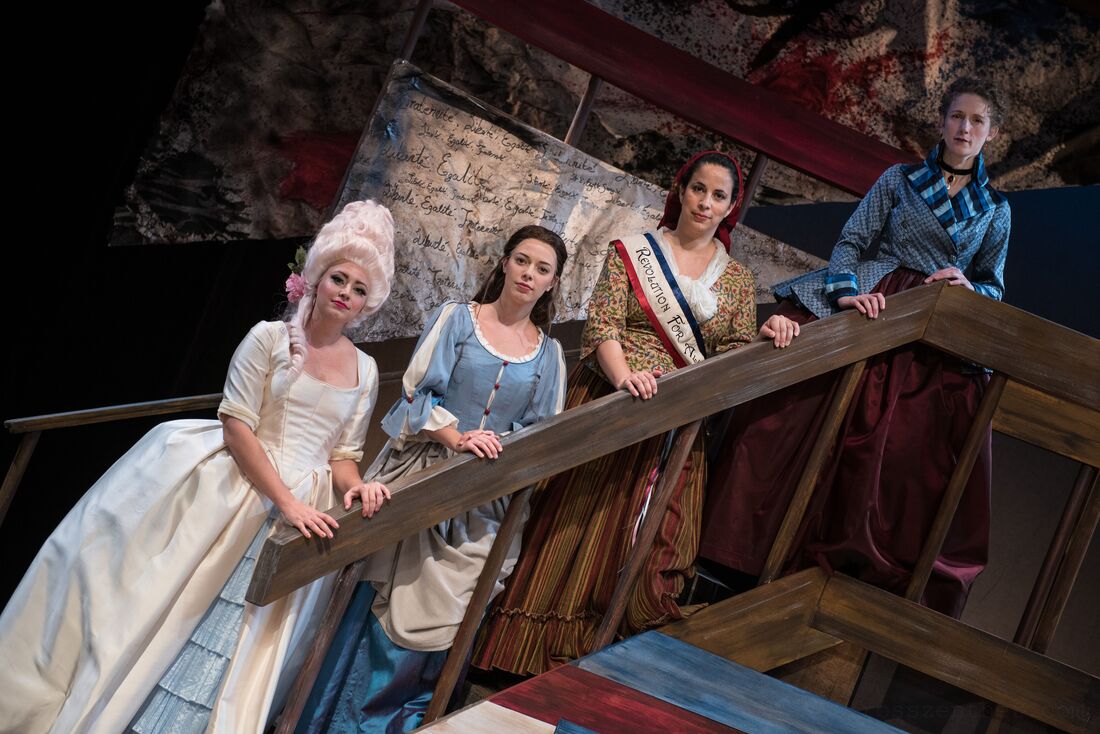
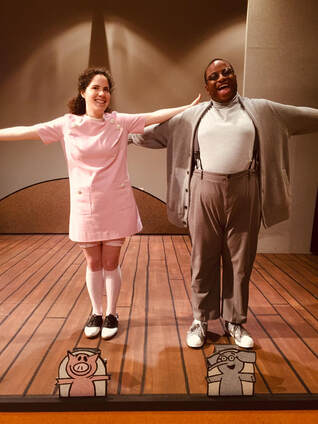
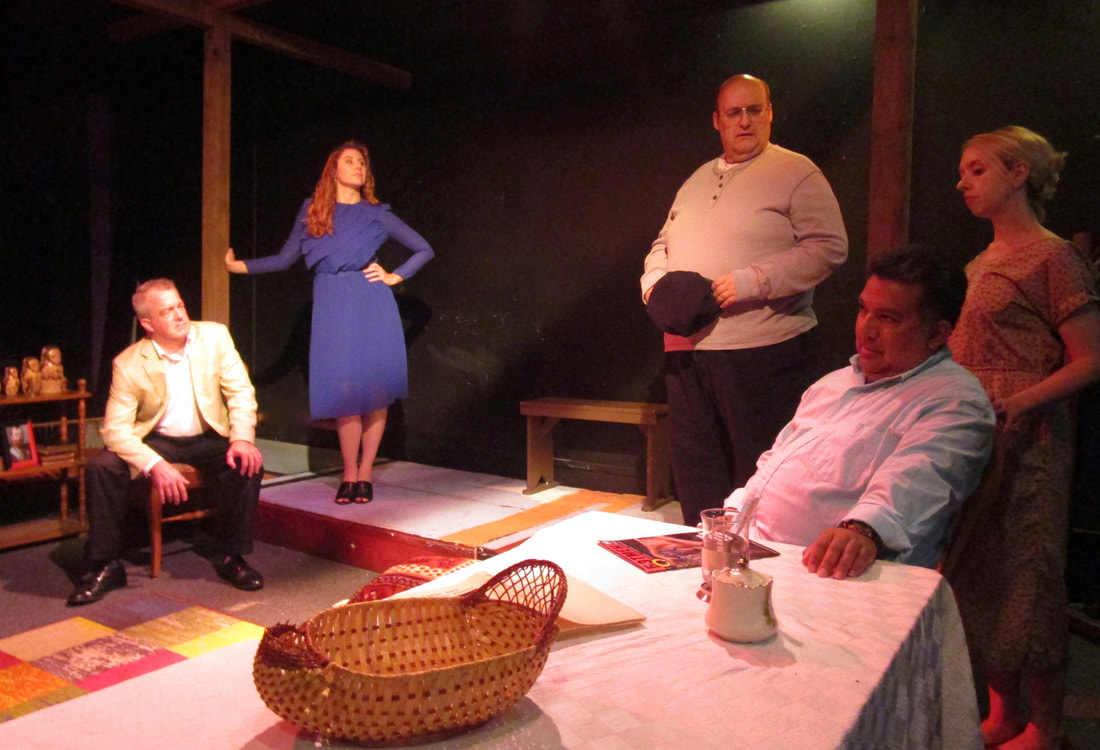
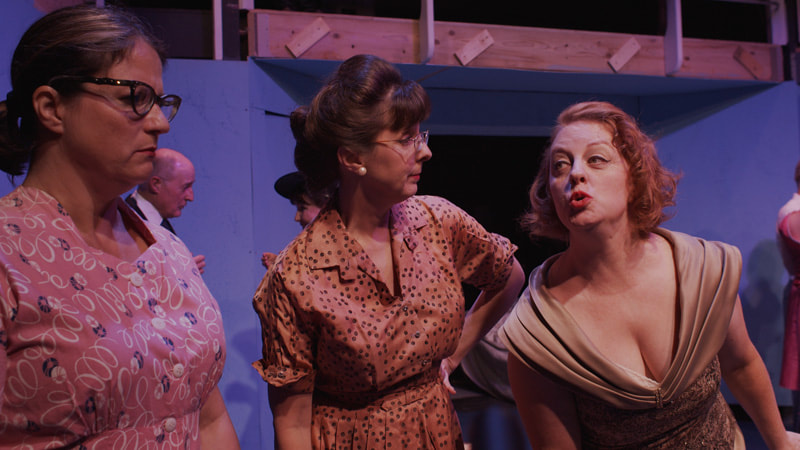
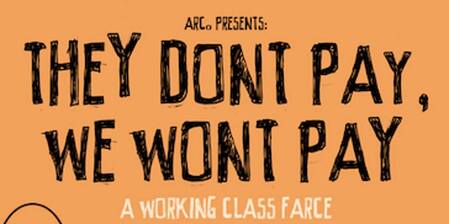
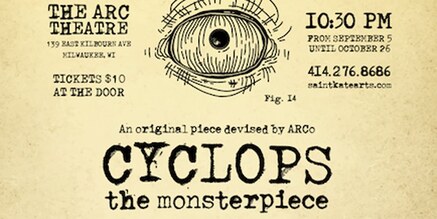

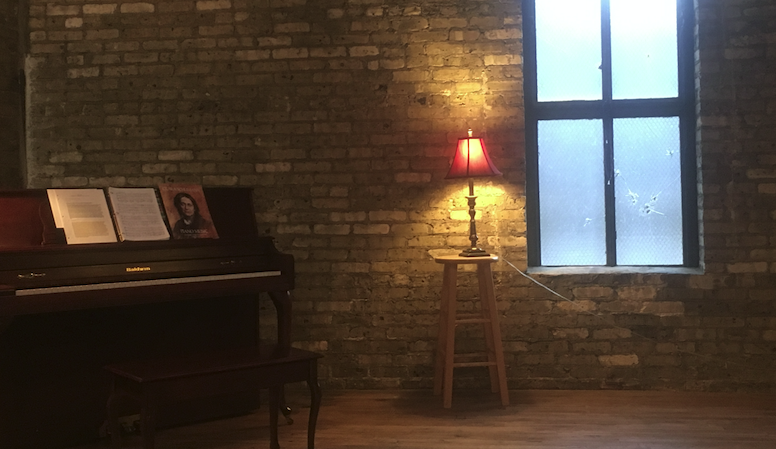
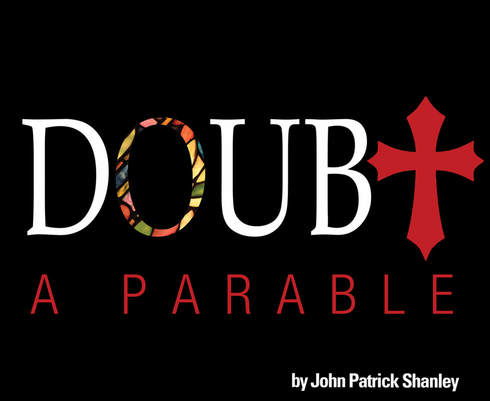
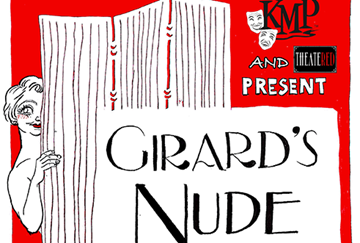
 RSS Feed
RSS Feed
